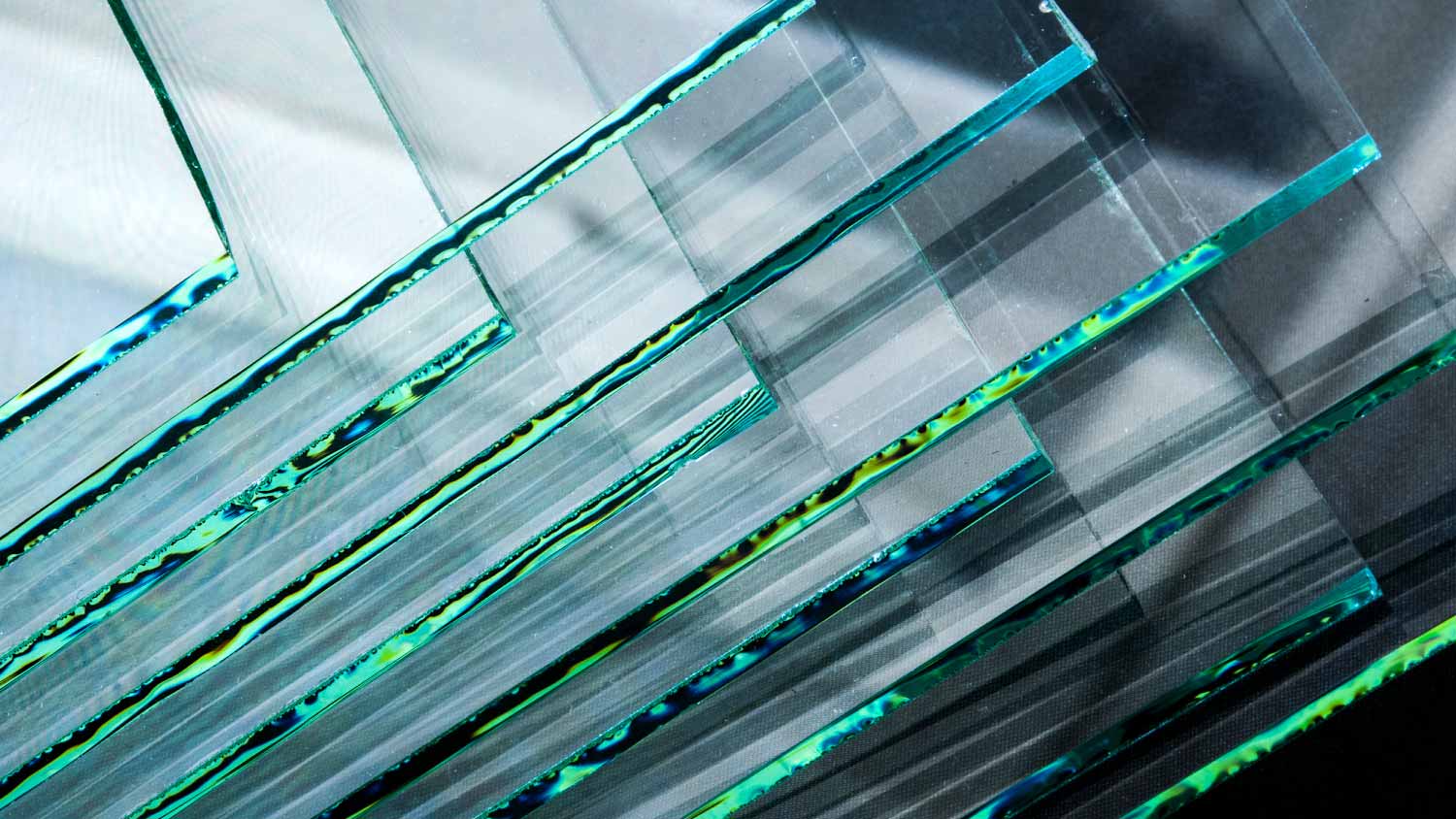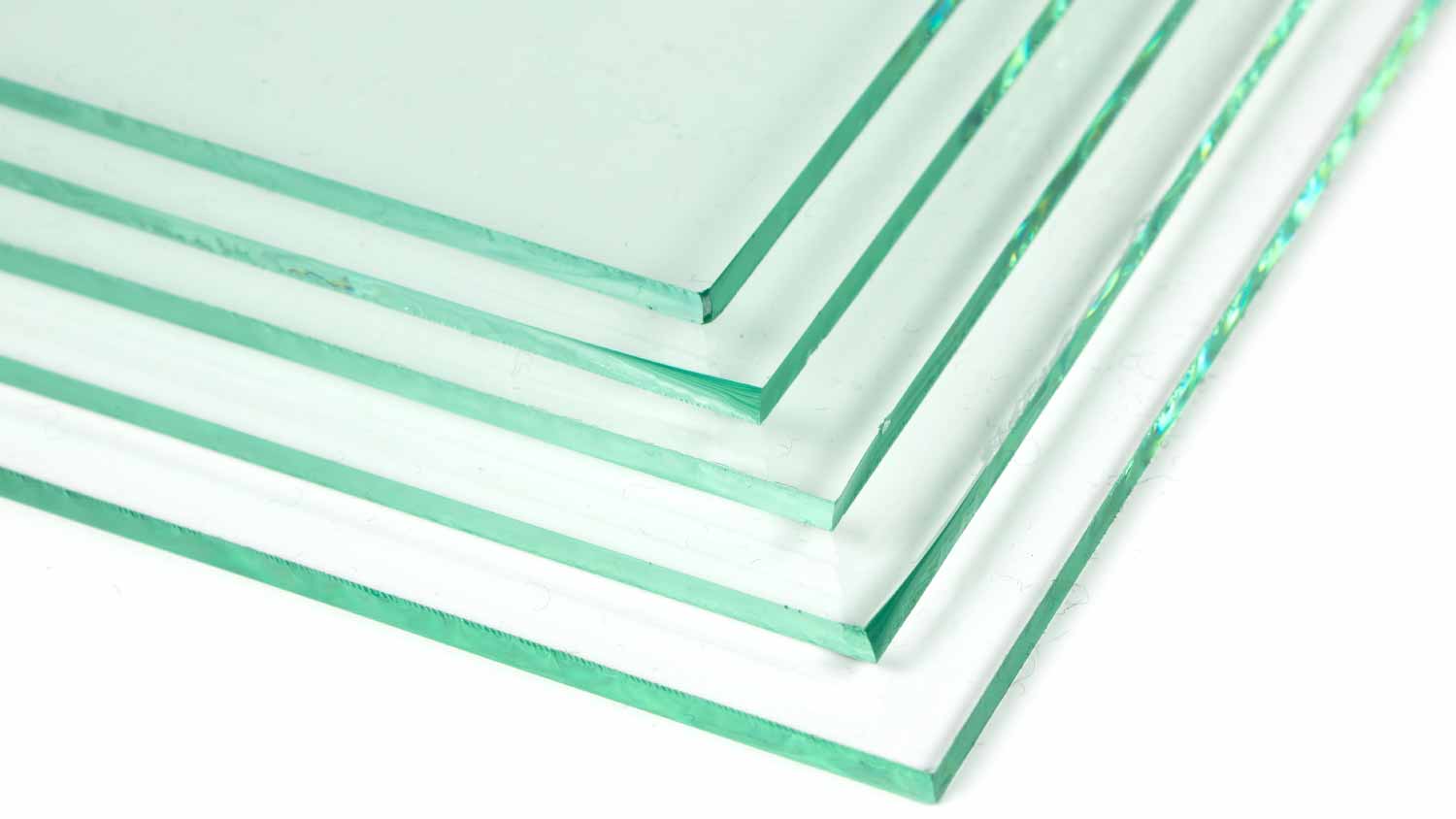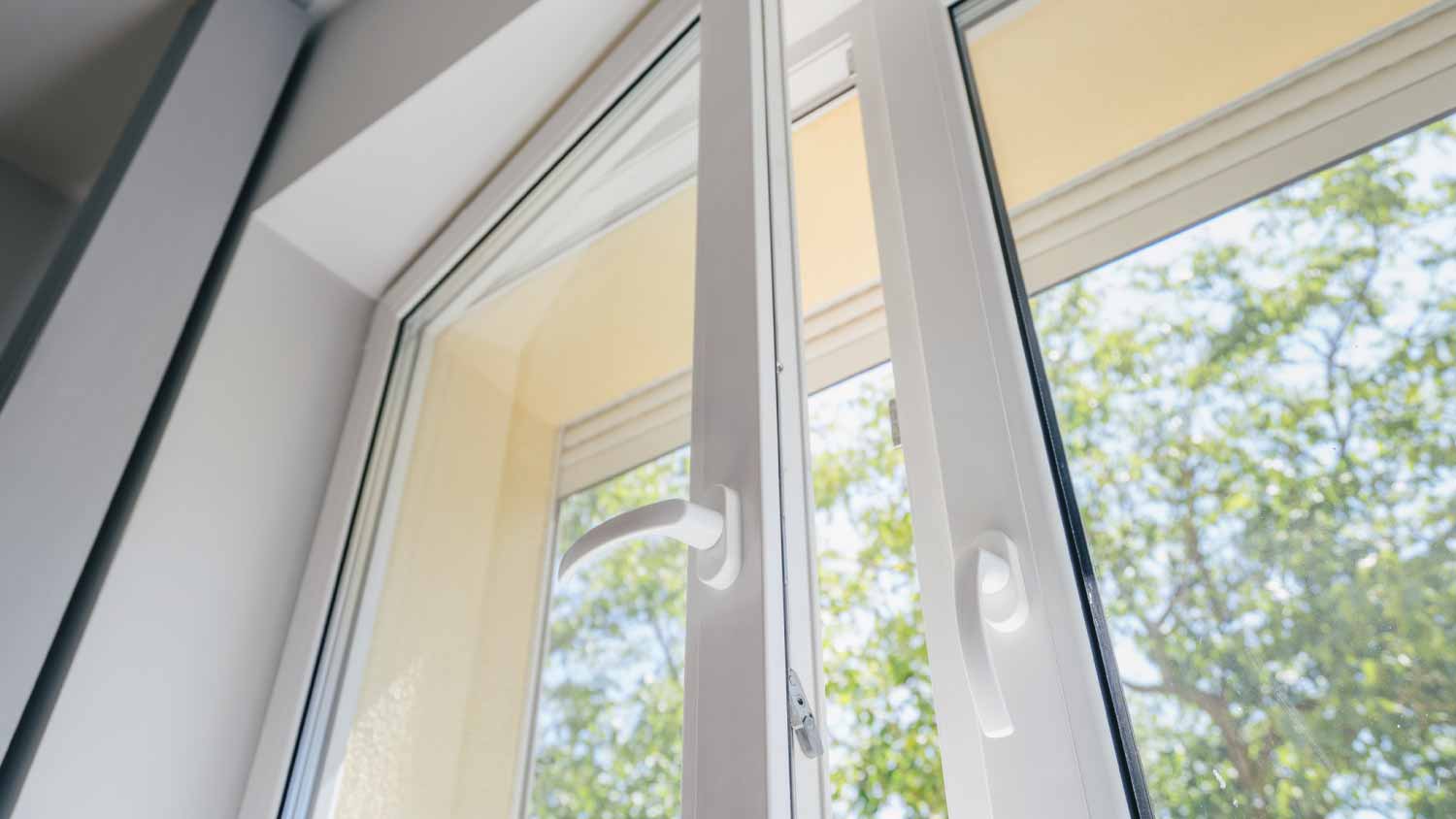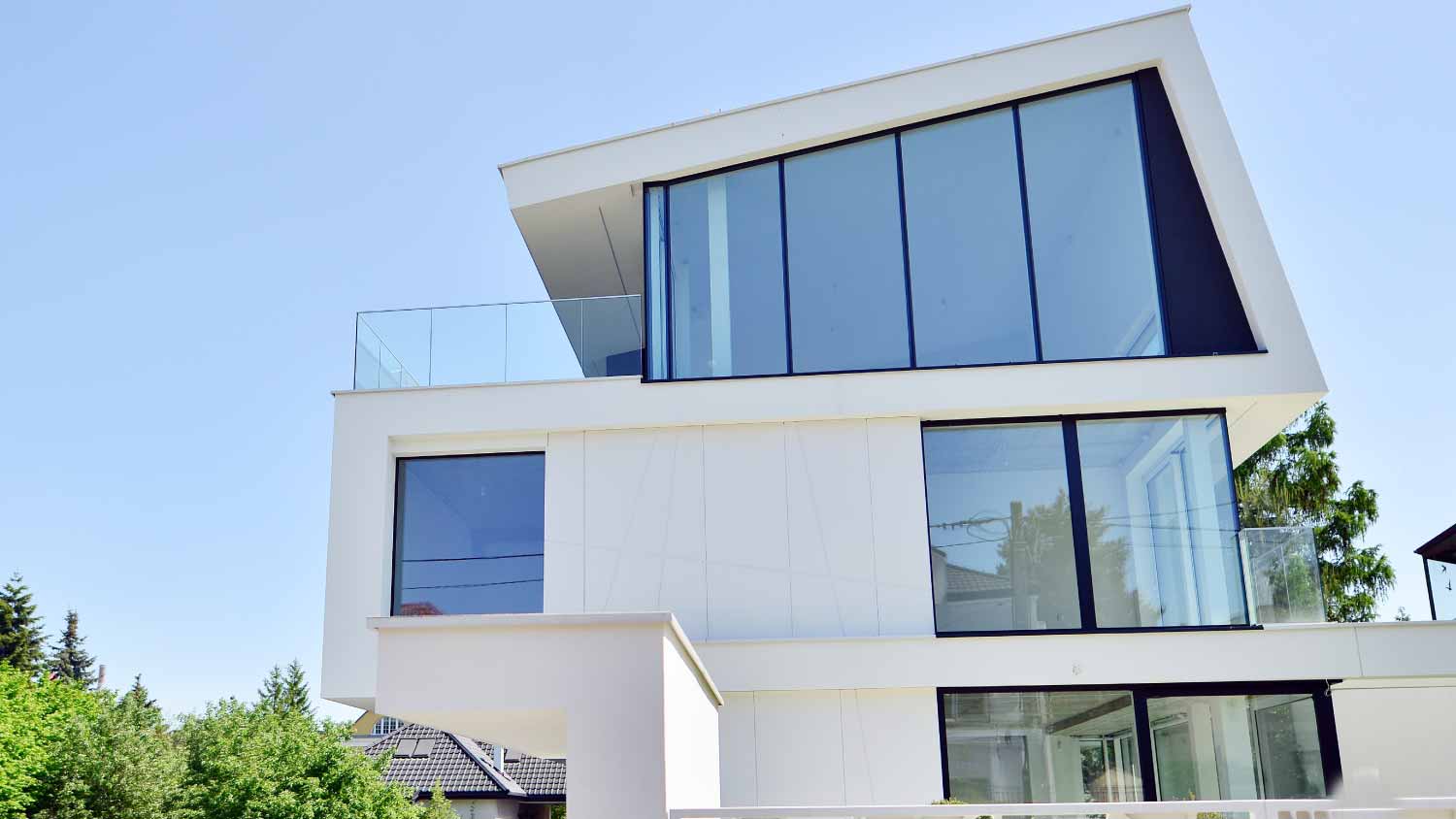8 Types of Window Glass and Their Features
Choosing the right type of window glass can help you see your home in a whole new light


The types of window glass in your home play a larger role in keeping it safe and comfy than you may think. Most window glass types receive additional treatments to increase their strength, reaction to impact, insulation, and even how they process UV rays. In addition to budgeting for your window glass replacement cost, get a sense of these window glass types to choose the most efficient for your design.
1. Float Glass

Float glass is one of the most popular types of window glass due to its low cost and simple manufacturing process. As a standard "flat" or "plate" glass, float glass manufacturers place pieces of molten glass on a metal tray into a single panel. You'll find float glass in many types of windows in your home, from skylights to mullioned panels on a French door. You can also find it on glass tabletops and other glass furniture.
One thing to know is that basic float glass can break and shatter easily. It’s not an ideal choice for all windows, particularly those on exterior doors or large windows prone to extreme weather.
| Pros | Cons |
|---|---|
| Budget-friendly | Shatters when broken |
| Easy to clean | Not insulated |
| Versatile | No noise reduction |
Best for: Small windows on a budget
2. Annealed Glass
Annealed window glass is heated to a high temperature and then cooled quickly for extra strength. Annealed glass is stronger than basic float window glass, but you can still cut and shape it with little resistance. On the other hand, the shards of broken annealed glass can be sharp, jagged, and dangerous. When it comes to strength and cost, annealed glass falls between float and tempered glass.
| Pros | Cons |
|---|---|
| Budget-friendly | Jagged when broken |
| Easy to cut and etch | Not well insulated |
| Stronger than float glass | Weaker than tempered glass |
Best for: Basement egress windows, door sidelights, and transoms
3. Tempered Glass

Tempered glass takes the annealed glass process to the next level. Manufacturers heat the glass to a very high temperature and cool it even more quickly. The strength that this process provides keeps the glass from shattering into small shards. On the other hand, this property means that it is much more challenging to shape the glass without breaking it.
Homeowners often prefer tempered glass for first-floor windows prone to local foot traffic or for large skylights that require ample strength. While the glass can be duller than other varieties, it is still clear enough for standard ground-floor windows.
| Pros | Cons |
|---|---|
| Very strong | More expensive |
| Does not shatter | Difficult to cut |
| Clear enough for standard windows | Difficult to repair |
Best for: All types of exterior windows
4. Laminated Glass
You would need to use a lot of force to break laminated window glass. Strong enough for car windshields, laminated glass combines two pieces of glass around a resin glue called PVB, or polyvinyl butyral. Since there is a thin layer of air between the panels, this type of window glass is stronger, better insulated, and even protective against sound. While you'll pay up to $20 per square foot for laminated glass, it’s ideal for blocking UV rays from your home and protecting it from extreme weather.
| Pros | Cons |
|---|---|
| Blocks nearly all UV rays | Higher costs |
| Does not break or shatter easily | Complex installation |
| Muffles sound | Expensive to replace |
Best for: Homes in areas prone to large storms and loud noise
5. Frosted/Obscured Glass

Frosted glass is not only stylish, but increases privacy as well. Obscured glass, on the other hand, allows people on the inside of the home to see outside, but not vice versa. You'll find these windows in bathrooms, first-floor apartments, or on front doors.
Frosted, obscured, and stained glass all come with a higher price tag. For example, the cost of a stained glass window averages about $600 including installation of the frame.
| Pros | Cons |
|---|---|
| Promotes privacy | Higher costs |
| Decorative | Can obscure light |
| Highly versatile | Difficult to repair |
Best for: Adding privacy throughout your home
6. Gas-Filled Glass
Depending on where it is in your home, you'll have the choice between single, double, and triple-paned windows. Double and triple-paned windows frequently feature either krypton or argon gas between the panels for insulation and noise reduction. The gas is both non-toxic and denser than regular air, making it a safe option for insulating your home where it needs it most.
You'll find many types of glass in these multi-paned windows, from float glass to tempered. Since installation is far more complex, it's important to hire the right window replacement contractor to ensure that the panes properly seal in the gas.
| Pros | Cons |
|---|---|
| Insulates your windows | Higher costs |
| Reduces sound | Difficult insulation |
| UV protection | Can lose its seal |
Best for: Energy-efficient window solutions with traditional glass
7. Low-E Glass

If you'd rather skip the multiple panes but still keep extreme temperatures at bay, low-E windows are a great solution. Also known as low-emissivity glass, the unique material blocks infrared and UV rays from passing through the window. However, the glass allows all other light to enter your home, therefore not restricting the view. While they will cost up to 15% more than traditional glass, you'll also save about 30% on your home energy bills. There are also several types of low-E coatings to choose from depending on your local climate.
| Pros | Cons |
|---|---|
| Lowers utility bills | Much higher cost |
| Restricts UV home damage | Blocks some visible light |
| Range of options | Not DIY-friendly |
Best for: Energy-efficient windows in extreme climate
8. Smart Glass

The cost of smart glass may be the highest on the market, but it’s with good reason. Smart glass windows feature automated glass that can change in tint, transparency, and levels of insulation. In other words, you can darken your windows for privacy at night or protect your floors from UV rays in the morning. While you can often adjust smart glass with a remote, some can adjust automatically based on the sun and temperature.
Keep in mind that smart glass requires a rather complex setup, including the attached system to adjust the windows' settings, and can also be quite costly to repair. It’s best to find a window replacement specialist near you to do the installation. That being said, this technology can lower your utility bills and change the way you decorate and interact with your home.
| Pros | Cons |
|---|---|
| Lower utility bills | Very high costs |
| Enhances privacy | Complex installation |
| Fully customizable | Difficult repairs |
Best for: High-tech homes with large picture windows















